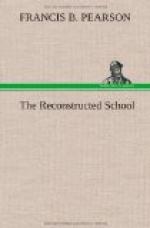If, then, the relation between major ends and minor means has been made clear, we are ready for the statement that these major ends may be made the common goals of endeavor in the schools of all lands. Thoroughness is quite as necessary in the rice fields of China as in the wheat fields of America, as necessary in the banks of Rome as in the banks of New York, quite as essential to mercantile transactions in Cape Town as in Chicago, and quite as essential to home life in Tokyo as in San Francisco. If these big objectives are set up in the schools of all countries pupils, teachers, and people will come to think in unison and thus their ways will converge and they will come to act in unison. The same high purposes will actuate and animate society as a whole and this, in turn, will make for a higher type of civilization and accelerate progress toward unity in school procedure.
CHAPTER FOUR
INTEGRITY
Integrity connotes many qualities that are necessary to success in the high art of right and rational living and that are conspicuous, therefore, in society of high grade. It is an inclusive quality, and is, in reality, a federation of qualities that are esteemed essential to a highly developed civilization. The term, like the word from which it is derived, integer, signifies completeness, wholeness, entirety, soundness, rectitude, unimpaired state. It implies no scarification, no blemish, no unsoundness, no abrasion, no disfigurement, no distortion, no defect. In ordinary parlance integrity and honesty are regarded as synonyms, but a close analysis discovers honesty to be but one of the many manifestations of integrity. Lincoln displayed honesty in returning the pennies by way of rectifying a mistake, but that act, honest as it was, did not engage all his integrity. This big quality manifested itself at Gettysburg, in the letter to Mrs. Bixby, in visiting the hospitals to comfort and cheer the wounded soldiers, and in his magnanimity to those who maligned him.
In every individual the inward quality determines the outward conduct in all its ramifications, whether in his speech, in his actions, or in his attitude toward other individuals. It is quite as true in a pedagogical sense as in the scriptural sense that “Men do not gather grapes of thorns or figs of thistles,” and, also, that “By their fruits ye shall know them.” The stream does not rise higher than the source. What a man is doing and how he is doing it tells us what he is. When we would appraise a man’s character we take note of his habits, his daily walk and conversation in all his relations to his fellows. If we find a blemish in his conduct, we arrive at the judgment that his character is not without blemish. In short, his habitual acts and speech, in the marts of trade, in the office, in the field, in the home, and in the forum betoken the presence or absence of integrity.




